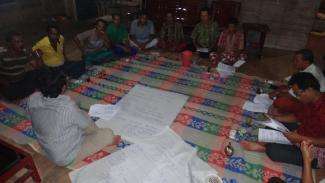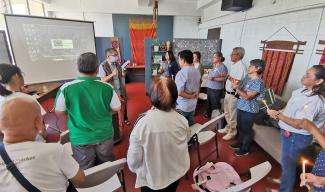Indonesia's Timber Legality Verification System (SIstem Verifikasi Legalitas Kayu, or SVLK) is intended to ensure that all timber produced in Indonesia comes from legal sources. In addition to a system of independent auditors, SVLK includes a formal role for civil society to monitor legality compliance. The Independent Forest Monitoring Network, or JPIK, is one of the central players in this civil society effort.
A network of 64 NGOs and over 300 individuals across 23 provinces in Indonesia, JPIK is currently trying to ramp up monitoring efforts. Currently it is focusing on increasing capacity of monitoring in communities near forest concession areas through village-level training.
As part of this effort, in mid February, Mitra Insani Foundation (YMI Riau), a member of JPIK, conducted trainings about SVLK for sixty forest communities.
The trainings were carried out in three villages in two different districts located near forest concessions. The training in Serapung (Pelalawan District) was conducted on 17-18 February, the training in Harapan Jaya (Indragiri Hilir District) was on 18-19 Feburary, and the training in in Segamai village (Pelalawan District) happened the following week on 25-26 Feburary.
Harapan Jaya village is located around PT Sumatra Riang Lestari's concession. Serapung Village is near concessions owned by PT Satria Perkasa Agung, PT Mas Trio FDI, and PT Kampar Fiber. And Segamai village is located close to concessions owned by PT Mitra Hutani Jaya, PT Satria Perkasa Agung, and PT Raiu Andalan Pulp and Paper.
During the training, community members were invited to share information and dicuss issues related to forest governance and processes in SVLK such as issuing certificates and independent monitoring.
The independent monitoring component of SVLK is based on community participation in foresting monitoring mandated by the constitution. The trainings discussed the procedures for monitoring, recording, and reporting company compliance to SVLK regulations, including the format for reporting violations.
This was the first time that SVLK was being discussed at the community level, according to those who participated in the trainings.
How are we supposed to report violations when we don't know about forest management regulations and the standard operating procedures of SVLK, said Eko Sugisantoso who participated in one of the trainings.
As YMI Riau and other member NGOs of JPIK continue to conduct such trainings, they will refine their approach and tailor information to the conditions in each area. The hope is that people like Pak Eko will soon have the capability to monitor this new system in their respective communities.




